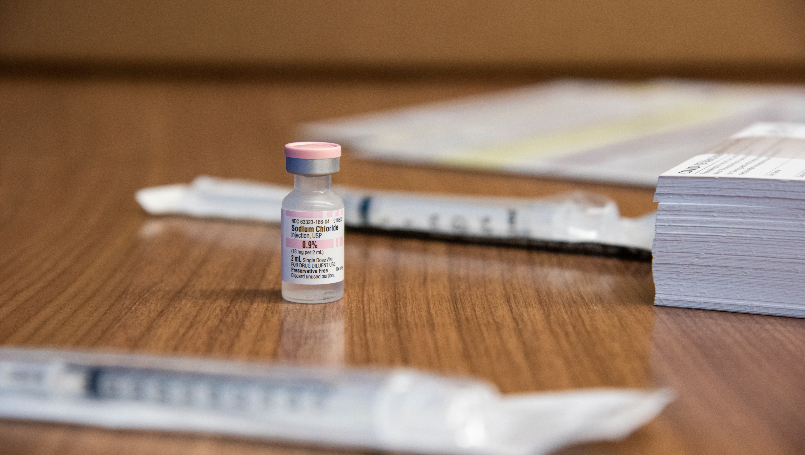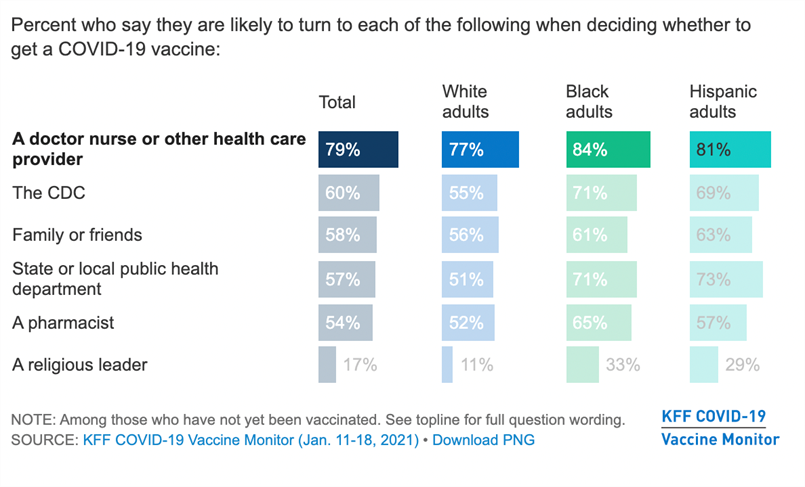Tuesday, April 27, 2021

As of late April 2021, nearly 100 million people in the U.S. have been fully vaccinated against COVID-19 and almost 140 million have received at least one dose. While those numbers are positive and inch us closer to beating this pandemic, recent polls show 1 in 5 Americans are unwilling to get the COVID-19 vaccine.
While we can all agree that we’d like to return to a pre-pandemic “normal,” the unwillingness of many to get the vaccine is causing researchers to believe that this hesitancy is enough to prevent the nation from reaching herd immunity.
Dr. Asha Shajahan, Beaumont family medicine physician and member of the U.S. Department of Health and Human Services COVID Community Corps, says she hears concerns about the COVID-19 vaccine daily from her patients.
“I’m happy to listen because only through dialogue can we come to an understanding of what the best choice is for us,” says Dr. Shajahan. “But I’ve also dedicated my life to keeping people healthy and there’s clear evidence that the COVID-19 vaccine will keep people safer and healthier than if not vaccinated.”
According to a recent nationwide survey, the leading cause of COVID-19 vaccine hesitancy are the possible side effects, followed closely by those waiting to see if it is safe. Mistrust of the vaccine and the government also play into people’s fears. Many also commented they were unsure if the vaccine would work or don’t believe they need it.
We asked Dr. Shajahan to address these responses and some of the most common questions she has received regarding the COVID-19 vaccines:
What are the side effects?
One of the No. 1 concerns about the COVID-19 vaccines is side effects. It’s important to remember that side effects are normal signs that your body is building protection. Some people experience them, and others do not. Just because you don’t, doesn’t mean your body isn’t building immunity either. Everyone reacts differently.
The most common side effects include:
- muscle aches
- chills
- fever
- headache
- nausea
- fatigue
- soreness of the injected arm
- redness or swelling at the injection site
It’s important to note that these side effects usually go away after 24 - 48 hours. If they last longer, call your doctor.
Some tips to help deal with these side effects include:
- Apply a cool washcloth or ice pack over the area of injection.
- Use or exercise your arm after vaccination.
- Drink plenty of fluids to avoid fever, nausea and chills before and after your vaccine. Electrolyte water is helpful as well.
- If you need to, you can take Tylenol or Motrin after vaccination to control symptoms. It’s not recommended to take it before vaccination or before having symptoms as it can ruin your immune response. We want the best immune response possible for the vaccine to protect you.
Are there long-term side effects?
Long-term side effects following any vaccination are extremely rare. Millions of people have received COVID-19 vaccines safely.
Are the COVID-19 vaccines safe?
COVID-19 vaccines are safe and effective. Millions of people in the United States have received COVID-19 vaccines under the most intense safety monitoring in American history. Worried about a major allergic reaction? Only .001% of people had anaphylaxis which occurred within 15 minutes of vaccination. That’s why at all vaccination sites monitor people for 15 minutes before they leave.
Serious side effects that would cause a long-term health problem are extremely unlikely following COVID-19 vaccination. Historically, if side effects are going to happen, they generally happen within six weeks of receiving a vaccine dose. For this reason, the Food and Drug Administration required each of the authorized COVID-19 vaccines to be studied for at eight weeks after the final dose.
Who can I trust?
According to a Kaiser Family Foundation Study, doctors or health care providers are the No. 1 trusted resource when it comes to information about the vaccine. If you have questions, talk to your doctor or health care provider and get your questions answered.

Weren’t these vaccines developed too quickly to be safe?
MRNA technology (Pfizer and Moderna) has been around for decades prior to the creation of the COVID-19 vaccines. That means it’s been researched and studied for much longer than a year. Contrary to popular speculation, it was built from years of research. Adenovector technology (Johnson & Johnson and AstraZeneca) has been around since the first vaccine was made in 1796.
The vaccines we’re utilizing today have benefited from 10 - 15 years of strong research. It’s definitely not a new technology.
Don’t other people need it more than me?
You may be thinking, I’m a young and healthy individual, there are plenty of people that need this vaccine before me. At this point, the vaccine is widely available. It’s open to anyone age 12 and older. Therefore, by getting vaccinated you are helping get to the goal of herd immunity, which ultimately puts everyone in a safer place than if you wait to get vaccinated.
The longer we wait to get vaccinated, the more likely variants are to emerge. The best way to stop variants is to be vaccinated and decrease the spread of infections.
Do the vaccines actually work?
All three vaccines available in the U.S. are highly effective. Vaccination is preventing COVID-related deaths and very severe illness. This is a big win because how you will react to the virus is so unpredictable. Why take the chance? It’s a wager between life or death.
The current surge in Michigan showed that most of the hospitalized adults were between the ages of 30 and 50 years old. This demonstrates the effectiveness of the vaccine as the majority of the 55 and older population were already vaccinated.
Do I really need the vaccine?
If you are healthy, you can still get COVID-19 and have devastating long-lasting symptoms or even die. So yes, you do.
Perhaps you were already infected with COVID-19. If it’s been longer than three months, it’s time to get vaccinated. The vaccines have longer immunity than natural infection. You want to be protected as long as possible.
What if I just don’t like vaccines/shots?
Nobody really likes getting shots, but nobody likes getting sick either. I’ve administered hundreds of COVID-19 vaccines, trust me, this is the one vaccine that leaves people smiling. Why? Because with every shot, we are one step closer to a COVID-free world.
I get it, maybe traditionally, you’ve opted out of vaccines. You never get a flu shot nor do you get the flu because you’re young and relatively healthy. COVID-19 doesn’t care if you’re healthy or not. We’re in the middle of a pandemic and there’s no way out of it without vaccination. We can get back to the things we love to do as soon as we get everyone vaccinated. This is a team effort.
How much will this cost me?
The Coronavirus Aid, Relief, and Economic Security Act (CURES) ensures that the vaccines are free of charge to all people in the U.S. regardless of immigration or health insurance status. Even if you are asked for insurance information, you should not be charged. You cannot be denied a vaccine due to inability to pay.
Next Steps and Helpful Resources
- Vaccine Episodes of the Beaumont HouseCall Podcast
- Talk to your trusted primary care doctor who knows you and your health history
